- Home
- Hokkaido, Japan
- North Korea Fires Missile Over Hokkaido, Japan Again
North Korean Missiles Over Japan: Reactions, History, Statistics
Note for the Press: All of the content of this reporting is available for immediate use. Please provide a link to this report and full credit to Find Hokkaido Agents. If you use any of our reporting, please contact us with more details about your publication. We are happy to discuss our research and may also be able to offer additional resources.
KEY DETAILS
- Original Reporting on North Korean missile tests
- Direct comments from our interviews with Hokkaido residents
- Original comments from local, regional, and national departments of the Japanese government
- Details of past tests that have affected Hokkaido
- Dates and details about North Korean missile testing in Hokkaido
Much more on each of these topics below.
Local Hokkaido Residents React to Latest North Korean Missile Test
On April 13, 2023, North Korea conducted yet another test of a ballistic missile that landed near Hokkaido, Japan. When a North Korean test missile might enter Japanese airspace around Hokkaido, the local residents receive a notice from the Japanese J-ALERT system on their cellphones. All at once every phone in Hokkaido rings, flashes, and vibrates, bringing the residents of Hokkaido to high-alert.
Are these missile tests from the North Koreans serious? Are they dangerous? Should the local residents of Japan expect more?
In this original research, we surveyed local residents, professionals, and foreigners for comments and reactions. We collected these personal responses to show the impact of the North Korean missile tests on residents of Hokkaido:
It makes me uneasy, because who wants to have a missile shot over them? But it’s happened so many times, I feel like, ‘Again?’
— Mark, male, 55 years old, teacher, an American living in Sapporo
In our report below, we provide several more comments about North Korean missile from local Hokkaido residents, as well as complete details about the J-ALERT process, original comments from the Japanese government, a history of missile tests over Hokkaido, and more.
Table of Contents
- Local Hokkaido Residents React to Latest North Korean Missile Test
- North Korean Missile Tests That Triggered Alerts in Hokkaido from J-ALERT
- What Happens in Japan Each Time North Korea Fires a Rocket
- J-ALERT Alert System in Japan
- The History of North Korean Missile Testing
- North Korean Tests Over Japanese Territory
- What the Missile Testing from North Korean Means to the Japanese Government
Press Contact
For any inquiries related to the press, please contact us at pr***@****************ts.com.
———————–
Local Hokkaido Residents React to Latest North Korean Missile Test
While the missile testing activities of the North Koreans have an impact on the national security of Japan and international relations across the region, they also have a impact on the emotional lives of the local residents of Japan.
Local Japanese residents become aware of the North Korean military activities because the Japanese government shares that information with the public via a nationwide alert system (J-ALERT) that broadcasts to TV stations, sends emergency messages to cell phones, and uses loudspeakers in train stations and many public areas.
Each time there a test is announced, the general public is affected. Below are several examples of reactions and local emotional responses from citizens of Hokkaido:
It was a scary experience for residents. I always feel uneasy, probably a bit more than other people. Why can’t we all live in peace?
— Sayaka, female, 32 years old, writer, Japanese resident in Sapporo
The alert sound is scary, it’s loud, scary, and unnerving. The situation feels more real and feels scarier because of it. I don’t really know what to do when it goes off.
— Nana, female, 24 years old, retail, Japanese resident in Sapporo
Foreigners React to Missile Fired Over Hokkaido
I remember the first missile test I experienced very well. The phone started to vibrate, and there was a message I couldn’t read – but seemed important. As a foreigner just learning to speak Japanese, it made me anxious. I didn’t know what it meant. I didn’t know what to do next.
— Graham, male, 50 years old, entrepreneur, an American living in Sapporo
It makes me uneasy, because who wants a missile shot over them? But it’s happened so many times, I feel like, ‘Again?'”
— Mark, male, 55 years old, teacher, an American living in Sapporo
And for more, see our complete list of local reactions to North Korean missile tests from our interviews with Hokkaido residents.
Note for the Press: These reactions from Hokkaido residents are available for immediate use on other publications. Please provide a link to this report and full credit to Find Hokkaido Agents.
Recent North Korean Missile Tests That Triggered Alerts in Hokkaido
On April 13, 2023, North Korea conducted yet another test of a ballistic missile that raised alerts in Hokkaido, the northern island of Japan.
As the Japanese military detected the missile launch, a series of public safety procedures began, including activation of the J-ALERT system. As the J-ALERT is sent directly to the phones of Hokkaido residents, all residents in the warned area become aware of military activities of their North Korean neighbors.
Most Recent Missile Tests from North Korea:
The latest instance of a missile test in the Hokkaido regions was on December 8, 2023.
The particular test was of an inter-continental ballistic missile (ICBM). For the December 8, 2023 test, there was no alert announced by the Japanese government, and the testing was conducted without any effect on Hokkaido life.
The last time a missile test generated an alert for the Hokkaido residents was on April 13, 2023. Emergency messages in Hokkaido (and throughout Japan) were sent via Japan’s official safety alert system called J-ALERT. Emergency messages are sent to the cell phones of residents, are broadcasted on TVs, and announced in many public spaces and outdoor areas via loudspeakers. These emergency messages can include instructions to evacuate and to take shelter.
“If it is expected that a missile will pass through Japan, the Japanese government will use the National Early Warning System (J-ALERT) at any time to transmit emergency messages.”
— Cabinet Secretariat National Security Affairs and Crisis Management, Japanese Government
Some examples of missile tests that triggered the J-ALERT in Hokkaido are as below:
Date: Apr 13, 2023
Type of missile: Intercontinental ballistic missile (ICBM)
Flight distance: Around 1,000km, max height over 6,000km
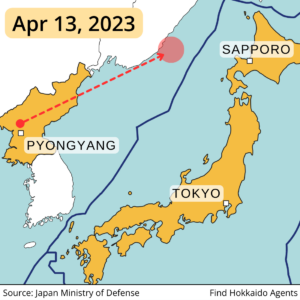
Date: Oct 4, 2022
Type of missile: No verified information, but longer range than an intermediate range ballistic missile (IRBM)
Flight distance: Around 4,600km, max height around 1,000km; landed about 3,200 km east of Japan
(There is no verified information about the type of missile, or the exact landing location)
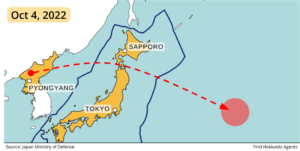
Date: Sep 15, 2017
Type of missile: Intermediate range ballistic missile (IRBM)
Flight distance: Around 3,700km, max height around 800km
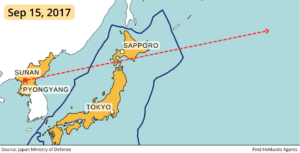
Date: Aug 29, 2017
Type of missile: Intermediate range ballistic missile (IRBM)
Flight distance: Around 2,700km, max height around 550km
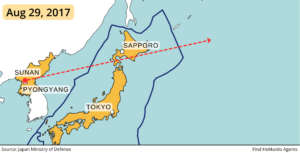
—
J-ALERT Emergency Alert System in Japan
In cases of emergencies in Japan, every phone, tv, and public announcement platform warns citizens in the areas of danger. Sirens blare, warning messages appear on phones and TVs, and residents are told to take shelter in a safe area. Regarding ballistic missiles, in our direct interview with the Japanese government, we have received the following explanation.
In case of a ballistic missile launch, the Fire and Disaster Management Agency triggers the J-ALERT when the 1. Ministry of Defense recognizes a missile launch, 2. predicts that it would land in or fly over Japanese territory, and 3. the Cabinet Secretariat deems it necessary for evacuation.
— Civil Protection Office, Fire and Disaster Management Agency (Japanese Government)
Comment about the J-ALERT by a Japanese resident:
I think it’s effective in scaring people, but so far none of the missiles have hit land, so I feel like when a missile that’s actually targeted for damage comes, we wouldn’t be able to evacuate.
— Ryosuke, male, 22 years old, student, Sapporo resident born in Sapporo
Receiving this, we asked the local Hokkaido and Sapporo governments about how residents should think about the J-ALERT. In the interview, the official “White Paper on Fire Service” by the Fire and Disaster Management Agency was referenced repeatedly. This line in particular stood out, as it puts an emphasis on the importance of the J-ALERT:
In the case of an emergency that requires immediate action, the J-ALERT’s ability to instantly transmit a warning through cell phones and speakers will play an important role.
— From the “White Paper on Fire Service”, by Japan’s Fire and Disaster Management Agency
For more information, see our post about the J-ALERT system in Japan, with specific notes on how that system has been used in Hokkaido.
—
The History of North Korean Missile Testing
A brief timeline of North Korean missile testing is as below:
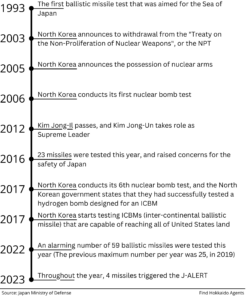
—
North Korean Tests Over Japanese Territory
HIGHLIGHTS:
— The first missile test by North Korea was conducted in 1993
— The year with the most tests was 2022, with a total of 59 tests
— Since 2020, there have been 100 missile tests (as of January 2024)
— For the year of 2023, 27 ballistic missile were launched (which is a 54% decrease from 2022)
“A series of actions by North Korea, including the repeated launches of ballistic missiles, threaten the peace and safety of our country and region as well as those of international society. They are totally unacceptable”
— Hirokazu Masano, Chief Cabinet Secretary, Japanese Government
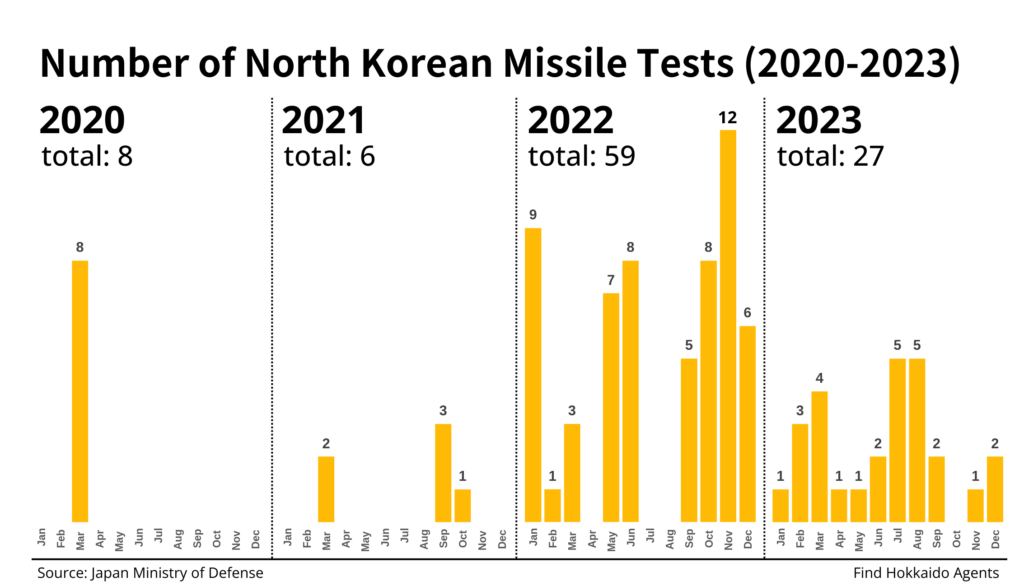
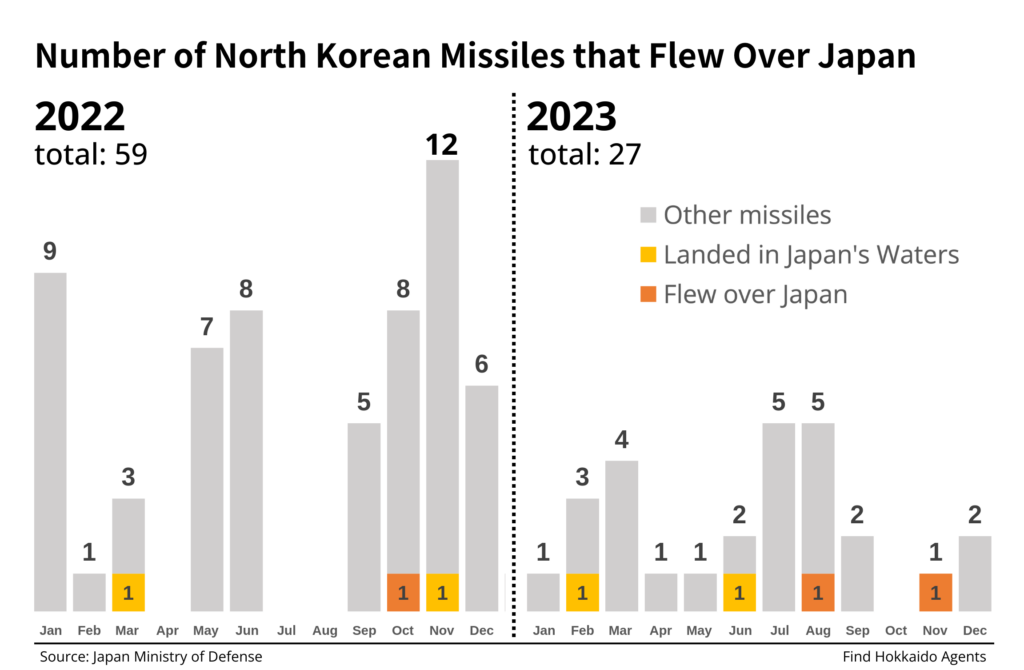
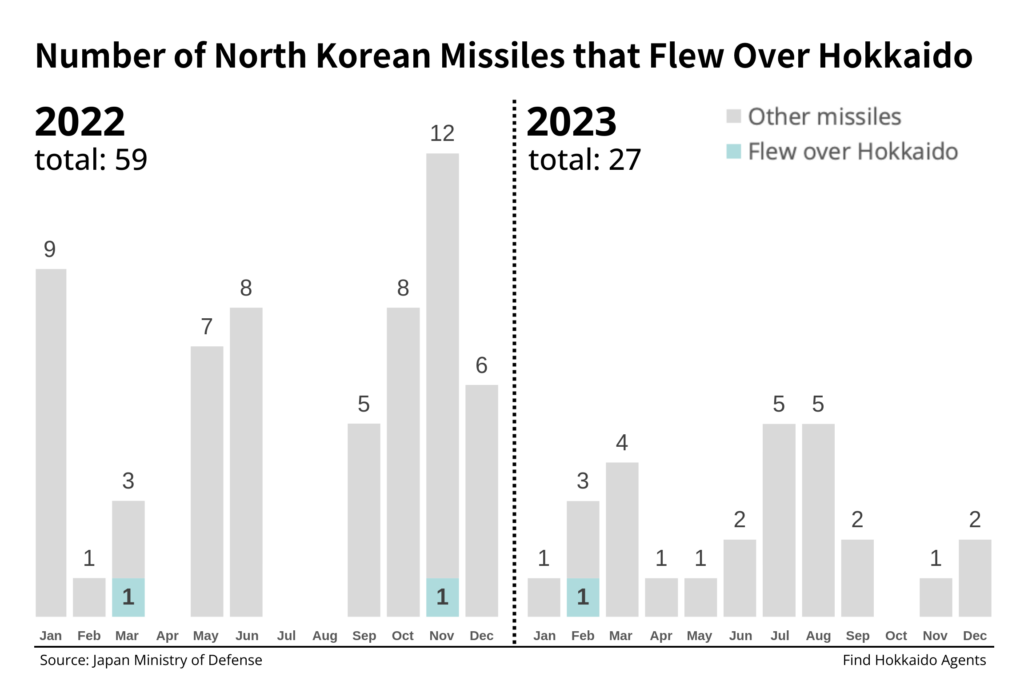
There have been a total of 180 missiles fired over Japan since Kim Jong-un has taken his role as Supreme Leader of North Korea. The first missile test was conduced in 1993, during Kim Jong-il’s leadership. While some periods have had more tests than others, since 2012 there have been an average of 16 tests per year. The highest number of missile tests in a year was 59, in 2022.
Recent North Korean Missile Testing Over Japanese Territory
Generally speaking, recent trends show that the number of missile testings are increasing. Since 2020, there have been a total of 100 tests (as of January 2024). In 2023, there were 27 tests of North Korea’s ballistic missiles.
The most unsettling category of missile launches for Japanese residents is the missiles that go over Japanese land. The most recent test that went over Japanese territory was one that was launched in Aug 24, 2023. This was a failed attempt in launching a satellite, using ballistic missile technology. The missile flew over Okinawa, and landed south of Japanese waters.
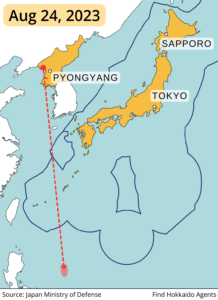
North Korean missile testing that takes place near Japanese territory, thus far, has resulted in three outcomes:
1. The missile does not reach Japan and lands in North Korean waters
2. The missile lands in Japanese waters, but doesn’t go over land
3. The missile flies over Japanese land and lands on the other side
When a missile leaves North Korea but does not enter Japanese airspace, Japan does not typically activate the emergency message system. While there have been some cases when alerts were issued, most J-ALERTs are only issued when a missile launched from North Korea is predicted to enter the airspace of Japan or to land in Japanese waters.
For a recent example: on December 18, 2023, North Korea conducted a missile test that landed in North Korean waters and did not result in a J-ALERT.
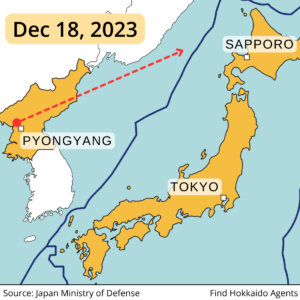
On the other hand, a missile launched on November 21, 2023 flew over southern Japanese waters, and caused the government to send out a J-ALERT to Okinawa residents.
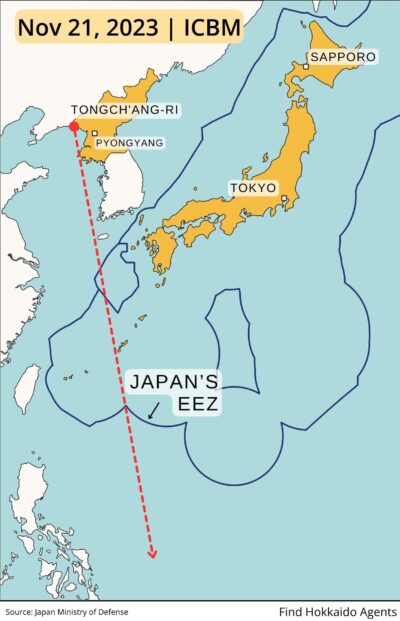
—
Press Contact
All of the content of this reporting is available for immediate use. Please provide a link to this report and full credit to Find Hokkaido Agents. If you use any of our reporting, please contact us with more details about your publication. We are happy to discuss our research and may also be able to offer additional resources.
For any inquiries related to the press, please contact pr***@****************ts.com.


